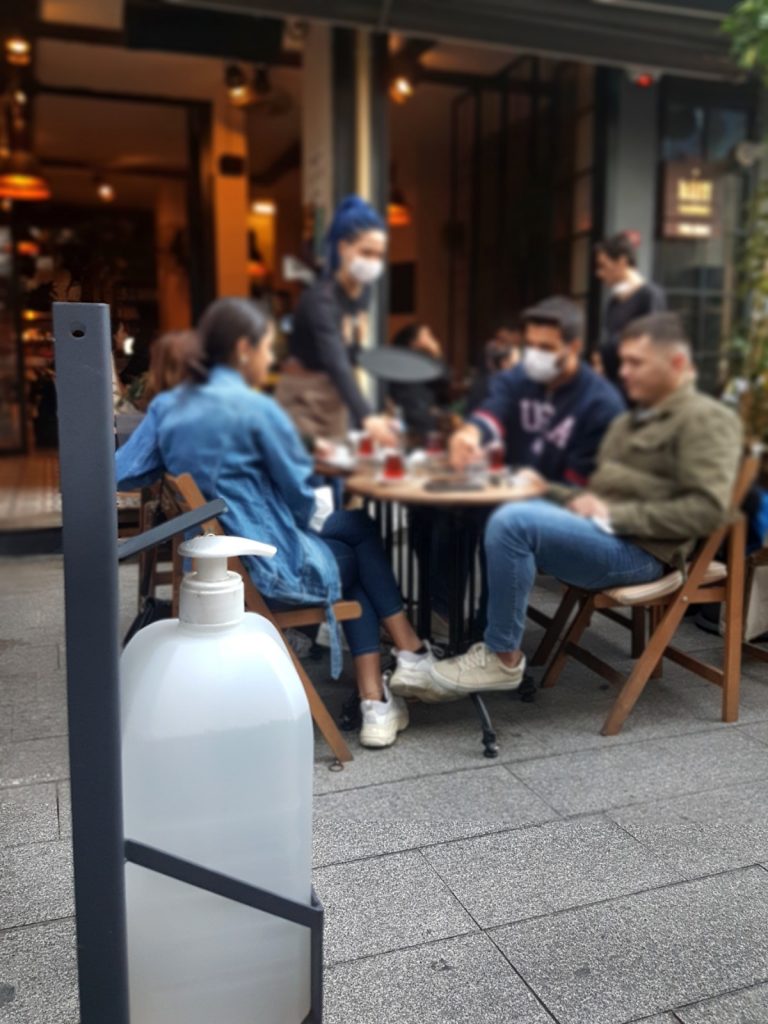One of the most difficult things for me during the pandemic period was not being able to go to my favorite cafés in Kadıköy, where I would often do my work on my computer with my coffee and çay. So, of course when the quarantine was over, one of the first things I did was wear my mask, take my lemon cologne in my bag, and rush to the beloved and long missed café on my street. But honestly, I was a bit worried.
My dear café worker friend, who would always greet me with a smiling face, this time greeted me with his white mask, white gloves, and thermometer which he held to my forehead like a gun for a temperature reading.
After my temperature was confirmed to be suitable, I was seated at a table, quite socially distanced from the people I had missed over these past months. My table was then disinfected and I gave my order.

Although these masks and gloves caught me off guard at first, they made me feel safe like other customers. This also meant facing the fact that there were fewer people and fewer tables, which made me emotional in realizing our new normal.
To get a sense of how other people were dealing with the change, I spoke with a fellow customer, Engin Kaban:
“I missed physically connecting with people the most during the pandemic period. I missed socializing and coming to the cafés in my neighborhood. One day, I was passing in front of a café where me and my friends used to meet during the pandemic period, and I just felt incredibly emotional. My friends and I met here as soon as it felt safe to do so, but nothing was the same when we got together. We were distant, nervous, and it was not always clear what people were talking about because of their masks covering their mouth. We can’t see too many people at the same time. We drink tea and put our masks back up immediately. I still couldn’t get used to it. Responsible cafés and restaurants can provide us an opportunity to take a break and forget what has happened. We need these responsible people as an example during this period.
For example, in a kebab restaurant I went to, the way they dealt with it was very irresponsible. I was not very welcomed when I reminded them about the necessary virus precautions.”
My waiter friend:
“Customers sometimes ask, ‘Have you sterilized the glass?’ This is a funny conversation. So much information and different ways to cope are on people’s minds. Some customers come with gloves and it is interesting to watch them drink their tea with plastic white gloves.
Most of our customers are working class people, who work outside of their homes and are more comfortable with this dynamic. For example, they would normally take a metrobus, bus, or metro to work, so instead by coming here they can feel more safe and comfortable working from a café.”
After the last set of regulations around the country, café and restaurant owners are very upset and desperate.
A café owner:
“New regulations such as zoning according to colors or changing the regulation rules of each region has confused people. People comes and confirm several times if the cafes have to close at 19:00 or 21:00, or is it the other way around. Many businesses have shut down, and it is very difficult economically to fight against. A friend of mine has been running different businesses for 48 years and had never experienced such a crisis. He ended up bankrupt for the first time and decided to leave Istanbul and return to his hometown.”
Another café owner friend says:
“We are on the brink of bankruptcy. After the new restrictions we have a few customers, but it is never the same as it used to be, and not the same energy or vibe. A two meter rule between tables, which means fewer customers, and fewer interactions between people. The profit we make doesn’t cover our losses. Quarantine hours are confusing not only for us but also our customers. We have to remind the customers often that they have to leave before 19:00 which is not a very Turkish thing to do. Sometimes we even have to debate about it. These are very unusual things.”
Another customer at the next table joins our conversation and adds:
“What I find strange is the pandemic caused reverse migration. People always wanted to come to Istanbul or big cities to work and make a life, but now it’s the opposite. They are running away from big cities. It is already difficult to find a job these days or those who have a job can work on the internet.” He smiles and adds: “I think big cities are no longer needed, a good wi-fi connection is the most important.”
We shook our heads and joined his laughter while drinking tea at our socially distant tables.









